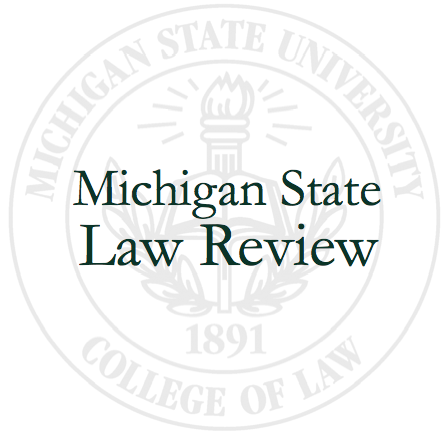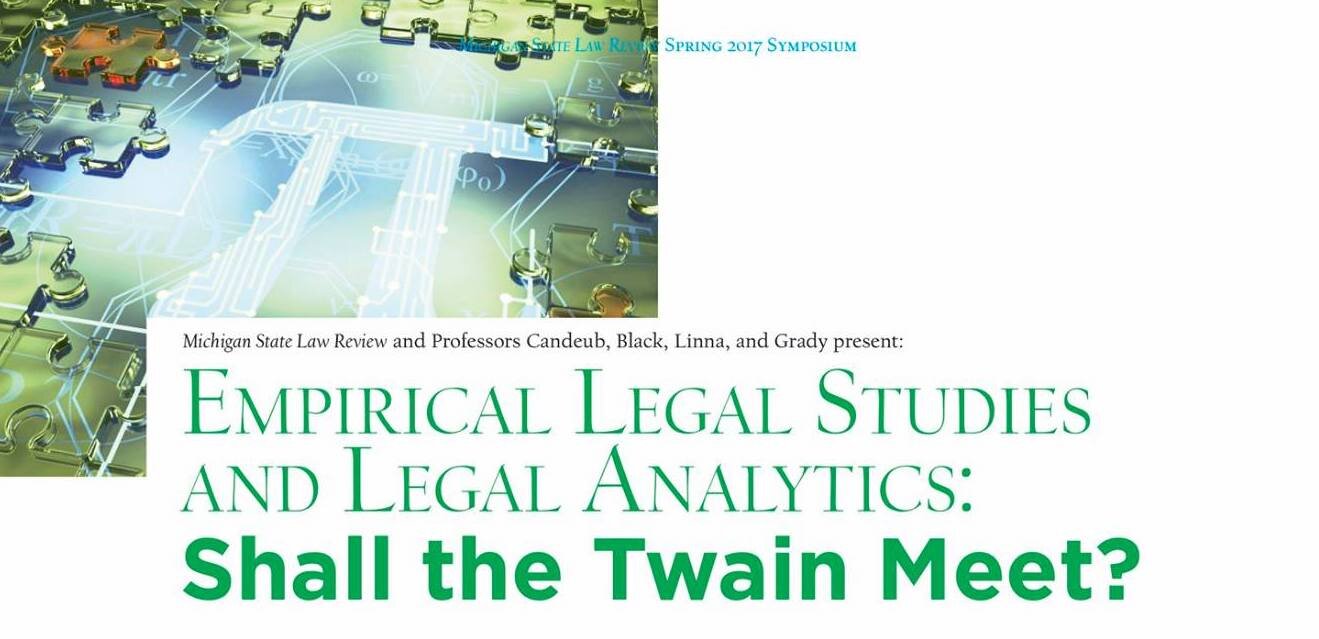The theme of Michigan State Law Review’s 2019-2020 Symposium was Law, Language, and Technology. Language is the raw material that comprises the law—whether that law take the form of an opinion, a statute, or a constitution. The language employed in a particular legal document—and how that language is interpreted—is the essence of legal practice. Technology is providing new lenses through which legal professionals can view and understand the intersection of law and language. Our Symposium invited top scholars to publish and present pieces related to the theme of law, language, and technology and was co-sponsored by Professor David Blankfein-Tabachnick, Professor James Chen, and Professor Daniel Barnhizer.
This symposium was the Michigan State Law Review’s first venture into a symposium workshop series—a hands-on, modern approach to the symposium format where authors visit the College of Law and workshop their pieces for the symposium in front of journal members and law school faculty. This symposium focused on the ever-important intersection of private values and public law, discussing the vast array of laws that shape how we make decisions, carry out business, and live in this dynamic, modern world.
Hosted by Michigan State University College of Law Professors Candeub, Black, Linna, and Grady, the Spring 2017 Symposium examined the emerging legal analytics industry and empirical legal studies. It looked broadly at the different goals and methods of each field, the data challenges and priorities both fields face, the possibilities for cooperation and collaboration, new applications of research in ELS and legal studies, and the special problems associated with developing natural language processing for legal texts.
Hosted by Michigan State University Professor College of Law Nicholas Wittner, this symposium discussed the legal issues, including liability, privacy, and regulation, involved with vehicle-to-vehicle safety communications and autonomous vehicle technology. This exciting symposium merged new vehicle technology and legal implications, bringing together great minds from the legal field and auto industry to discuss the current issues.
Hosted by Michigan State University College of Law Professor James M. Chen, this symposium explored the quantitative analysis of the law. Scholars discussed the need and possibility of an infusion of new methodological energy that may better answer questions that cannot be answered by other methods. The symposium demonstrated a few techniques beyond the most commonly deployed forms of quantitative analysis in law and demonstrated how those techniques could be used to study and predict the law.
Hosted by Michigan State University College of Law Professors Daphne O'Regan and Bruce Ching, the Persuasion in Civil Rights Advocacy symposium was hosted on April 9-10, 2015. Exploring persuasive methods used in civil rights disputes, the symposium considered the intersection of civil rights with law and rhetoric discussing persuasive arguments in issues such as same-sex rights, abortion law, racial conflicts, voting rights, and animal rights.
The Michigan State Law Review held the Public Domain(s) symposium in fall of 2014 from Thursday, October 2 to Friday, October 3, which was hosted by Michigan State College of Law Professors Jennifer Carter-Johnson and Adam Candeub, in conjunction with the Intellectual Property, Information & Communications Law program. The symposium centered around the conflict between patent and copyright law, which restricts public use of information, and intellectual property law, which recognizes that access to information is necessary to innovation.
In this historic symposium, the Michigan State Law Review worked in conjunction with the Michigan State University College of Education and the University of Missouri-Kansas City to present scholars reflections on Brown v. Board of Education and the Civil Rights Act of 1964. Hosted by Michigan State University College of Law Professors Kristi Bowman and Nicholas Mercuro, the event was part of the university-wide commemoration of the sixtieth anniversary of Brown and the fiftieth anniversary of the Civil Rights Act. The symposium took place on April 10-11, 2014.
Hosted by Michigan State University College of Law Professor Susan Bitensky, the Michigan State Law Review held a symposium in conjunction with the Lori E. Talsky Center for Human Rights of Women and Children. This fall 2013 symposium featured discussions that considered whether the United States should become a party to the United Nations Convention on the Elimination of All Forms of Discrimination Against Women.










Michigan State Law Review engaged with leading academics and activists as they discussed the nation’s responsibility regarding the history of racial injustice and explored possible ways to move toward healing.
Read Volume 2018’s Symposium Articles here.